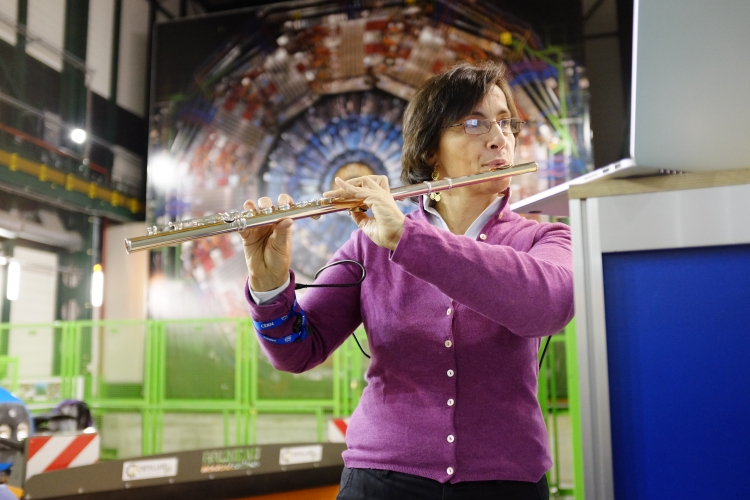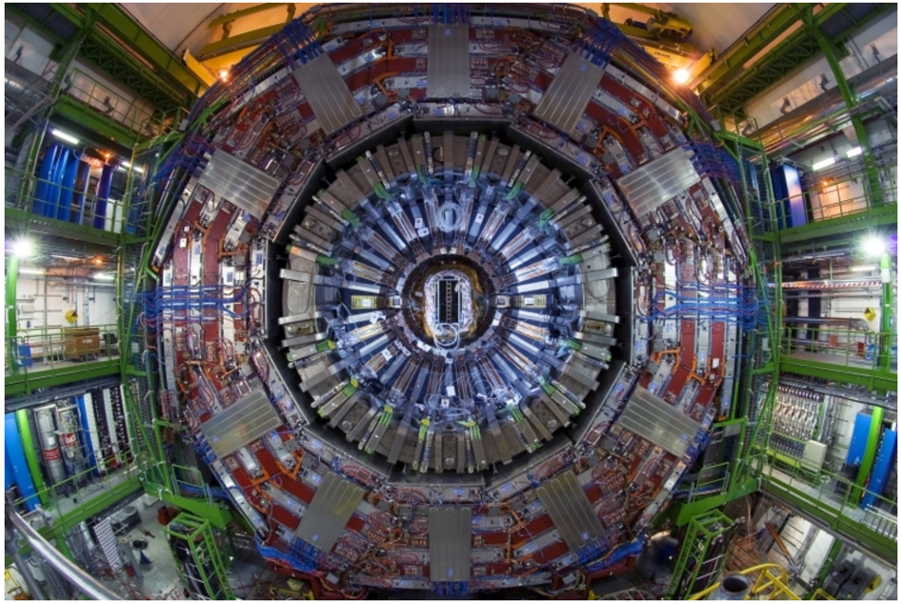
The EPS Emmy Noether Distinction for Women in Physics 2018 has been attributed to a CMS member, Dr. Chiara Mariotti "for her outstanding contributions to the discovery and characterisation of the Higgs boson, for her leading role as founder and coordinator of the LHC-wide Higgs Cross Section Working Group, and for her impressive capacities and achievements in outreach, in particular towards the young generation of physicists.”.
The European Physical Society has established the Emmy Noether Distinction for Women in Physics to:
- bring noteworthy women physicists to the wider attention of the scientific community, policymakers and the general public;
- identify role models that will help to attract women to a career in physics.
The scope includes personal achievements in areas such as research, education, outreach and industry.
Read a short interview with Chiara below.
How does it feel when the work you’ve been doing over the past years is recognised by an award?
Chiara Mariotti (CM): It was a great surprise and somehow unexpected after so many years. I felt super happy and still do. It is like going through the Higgs discovery time again!
What was your role in the Higgs Boson discovery?
CM: I contributed in many ways: before the start-up of the LHC I was in the group searching for the Higgs boson decaying into four leptons and there I worked to define the analysis and the data-driven methods to control the background. Later on, I was in charge of the Higgs Boson Analysis group that prepared the analyses for the very first data taking. After that, I founded and coordinated (for many years) the LHC Higgs Cross Section working group. This group was composed of experimentalist and theorists that compute the cross-section and uncertainties, define the analysis methods and strategies to later compare and combine the experimental results on the Higgs boson. The work and the result of the group were instrumental and fundamental for the discovery and successive measurements of the boson. I was also in charge of the LHC Higgs combination group (that combined the results of Atlas and CMS on the Higgs boson). In 2011 I became responsible for the HZZ group and during 2012 for the CMS Higgs combination group.
What was the most challenging part of it?
CM: I must say that everything was challenging: the data coming from a new detector and new accelerator, new software, new Monte Carlo simulations, new analysis methods to implement, but most of all the work on trying to extract a very tiny signal from a monstrous background.
Where we are with the research on the Higgs Boson now?
CM: Now it is a very difficult time since we have to measure with very high precision all the characteristics of the boson, in order to understand if there is new physics beyond and if the Standard Model is fully consistent.
What is it that makes physics so fascinating for you?
CM: Physics is a creative discipline. You need a lot of intuitions and imagination and a lot of detailed and hard work at the same time. The scientist has to face continuous challenges, has to come up with original ideas and therefore has to have the ingenuity to find different solutions. This is what makes our work fascinating. And both the search of the unknown and the precise measurement of what we know, have to be pursued in order to make progress. It is like in music: the duality between mathematical precision and artistic sensitivity is what fascinates me. The efforts to go beyond what we know, the mathematical or physical model, the musical score, is the engine that moves us forward.
Apart from regular research, you’ve been involved in many outreach activities. What is the key to success when communicating with the young generation now?
CM: The important thing for me is to make them understand how creative physics is. The fact that it allows you to express your ingenuity which is very rewarding. If you like challenges, you’ll like being a physicist.
What advice would you give to young researchers just starting out in the field?
CM: I am convinced that passion can drive you where you want to go. If you like what you do, you will do it well. So my suggestion is always to pursue the career you want. Science is really a lot of fun and passion. You need to be convinced of what you do and never stop. For girls, it can be a little more difficult because we are still in a male-dominated world where prejudices are unfortunately rooted. So there will be one more challenge to face. And for girls with children, the most difficult part is every day to be able to switch your brain towards work or toward the kids. I encourage very much girls to do physics since it is really a very creative world, where we can contribute originally.
- Log in to post comments

